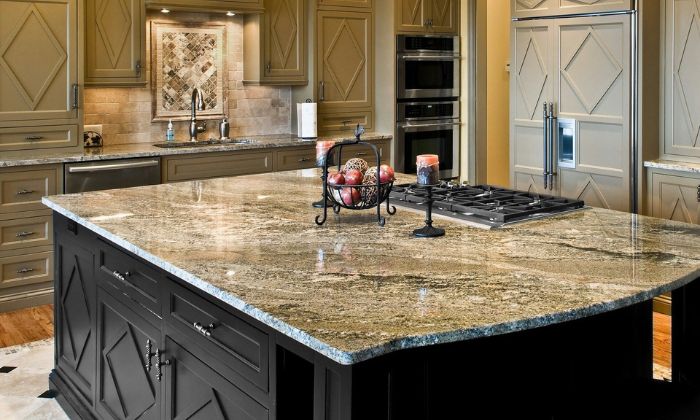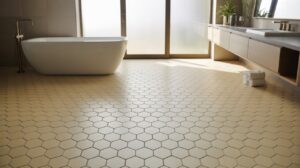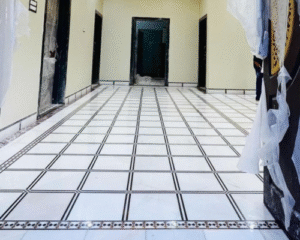Engineered Granite Countertops: Everything You Need to Know
When it comes to choosing the perfect material for your countertops, engineered granite countertops are a popular choice. These countertops offer a unique blend of natural beauty and modern engineering, making them an ideal option for homeowners who want the elegance of stone with added durability and practicality. In this article, we’ll explore everything you need to know about engineered granite, from its advantages and disadvantages to how it compares with natural granite.

Table of Contents
ToggleWhat is Engineered Granite?
Engineered granite, also known as manufactured granite or engineered stone, is a combination of natural stone particles, resin, and pigments. Unlike natural granite, which is cut directly from quarries, engineered granite is made in factories using advanced technology to produce slabs with a consistent look and feel. The process typically involves mixing crushed granite stones with resin binders, creating a solid, durable surface that mimics the appearance of natural granite but with added benefits.
One of the most attractive features of engineered granite countertops is their wide range of colors, patterns, and finishes, allowing you to achieve the perfect aesthetic for your home. Unlike natural stone, which can have irregularities and variations, engineered granite countertops offer a consistent appearance.
Advantages of Engineered Granite
Durability and Strength
Engineered granite countertops are incredibly durable and strong. The process of engineering granite involves bonding natural granite particles with resin, making the material highly resistant to damage. This gives it an edge over natural granite in terms of impact resistance, meaning it’s less likely to chip or crack under pressure.
Stain and Scratch Resistance
One of the most significant advantages of engineered granite is its resistance to stains and scratches. The resin used in manufacturing engineered granite helps seal the surface, making it less porous than natural stone. This makes engineered granite countertops more resistant to staining from food, oils, and liquids, making them an excellent choice for kitchen countertops. In addition, they are more scratch-resistant compared to some natural stones, making them suitable for heavy-duty use.
Variety of Colors and Patterns
Engineered granite is available in a wide range of colors and patterns, thanks to the pigments added during the manufacturing process. Whether you prefer a solid color or a more intricate design, engineered granite offers versatility in appearance that can complement any style of home decor. This gives you more flexibility than natural granite, which has a more limited selection of colors and patterns, depending on the quarry source.
Consistency in Appearance
Unlike natural granite, which may contain irregularities such as veining and discolorations, engineered granite is manufactured to be uniform in appearance. This means that you can expect a more consistent look across all the countertops in your kitchen or bathroom, making it a great option for large projects.
Lower Maintenance Compared to Natural Stone
While natural granite requires sealing to protect it from stains and moisture, engineered granite countertops typically do not need sealing due to their non-porous surface. This makes them much easier to maintain in the long run, saving you time and effort.
Disadvantages of Engineered Granite
Higher Cost Compared to Some Natural Stones
One of the main drawbacks of engineered granite countertops is the price. While they can be more affordable than certain types of natural granite, they can still be more expensive than other engineered stone products like quartz countertops. The cost of engineered granite can vary depending on the brand, colors, patterns, and region, but in general, engineered granite is considered a premium option for countertops.
Potential Issues with Heat Resistance
While engineered granite is generally heat-resistant, it may not be as heat-resistant as natural granite. The resin binding can be sensitive to extreme temperatures, which means placing hot pots or pans directly on the surface could cause damage over time. It’s always a good idea to use trivets or heat pads to protect your engineered granite countertops from high heat exposure.
Not Completely Natural
Some homeowners may prefer the authenticity and natural beauty of unaltered stone. Because engineered granite is not made entirely from natural materials, it may not appeal to those who are looking for a truly natural stone option for their countertops.
Common Uses of Engineered Granite
Engineered granite is incredibly versatile, making it suitable for a variety of applications in the home. Some common uses include:
Kitchen Countertops
Engineered granite countertops are a top choice for kitchens due to their outstanding durability and resistance to stains, making them practical for high-traffic cooking areas. Unlike natural granite, they are manufactured with added resins, enhancing their strength and uniformity. Available in a wide variety of patterns and colors, engineered granite offers both aesthetic appeal and versatility, allowing homeowners to match their countertops with any kitchen style. Whether you’re preparing meals or hosting gatherings, these countertops provide a long-lasting, low-maintenance solution that combines beauty and functionality.
Bathroom Vanities
Engineered granite is an excellent choice for bathroom vanities due to its durability, easy maintenance, and resistance to moisture and humidity. These qualities make it highly suitable for the bathroom environment, where surfaces are constantly exposed to water and varying temperatures. Its non-porous nature helps prevent staining and bacteria buildup, ensuring a clean and hygienic surface. Additionally, engineered granite offers a wide range of designs and colors, allowing homeowners to customize their bathroom vanities for both functionality and aesthetic appeal. Its longevity and low maintenance make it a practical and stylish option for modern bathrooms.
Flooring
Engineered granite is an excellent choice for flooring due to its durability and low maintenance. Made from a combination of natural stone and resin, it offers a strong surface that resists scratches, stains, and impacts, making it ideal for high-traffic areas. Its non-porous nature helps it withstand moisture, while its uniform appearance ensures a consistent and polished look. Whether in homes or commercial spaces, engineered granite flooring is a reliable, long-lasting solution that combines aesthetics with practicality, ensuring it maintains its beauty even in the most demanding environments.
Wall Cladding
Engineered granite wall cladding brings a luxurious and sophisticated touch to any space, enhancing the aesthetic appeal of your home. Ideal for areas like bathrooms, living rooms, and fireplaces, it provides a sleek, high-end look. The durable surface of engineered granite is resistant to wear and tear, making it a practical choice for areas with high traffic or moisture. Its polished finish adds elegance and complements various interior design styles, from modern to classic, ensuring your walls remain stunning and long-lasting. This material combines beauty with functionality, elevating your home’s overall ambiance.
Engineered Granite vs. Natural Granite
Aesthetic Differences
While both engineered granite and natural granite offer a similar aesthetic appeal, engineered granite typically provides more consistent colors and patterns. Natural granite, on the other hand, may have natural variations, veining, and imperfections that can give it a more unique, one-of-a-kind appearance.
Cost Comparison
The cost of engineered granite countertops is generally higher than some natural stones, but it is often more affordable than premium natural granite varieties. Additionally, the lower maintenance costs of engineered granite may make it a more economical option in the long run.
Longevity and Performance
Both materials are durable and long-lasting, but engineered granite is often considered slightly more reliable in terms of consistency and performance over time. Natural granite can be more prone to cracking or chipping if not properly maintained, while engineered granite tends to maintain its integrity better over time.
Environmental Impact
Natural stone quarrying can have a significant environmental impact, as it requires the extraction of stone directly from the earth, which can result in habitat disruption. In contrast, engineered granite often uses recycled materials in its production process, making it a more eco-friendly option. However, both materials have their own environmental footprints, so it’s important to consider this when choosing between the two.
Maintenance and Care for Engineered Granite
Cleaning Tips
To keep your engineered granite countertops looking their best, it’s important to clean them regularly using a mild soap solution and a soft cloth. Avoid using harsh chemicals or abrasive scrubbers, as these can damage the surface.
Sealing: Is It Necessary?
Unlike natural granite, engineered granite generally does not require sealing due to its non-porous surface. However, it’s a good idea to check with the manufacturer’s recommendations for your specific product.
Preventing Damage and Extending Lifespan
To prevent damage and extend the lifespan of your engineered granite countertops, avoid placing hot items directly on the surface, and be mindful of cutting on the countertops, as this could cause scratches.
Cost and Installation of Engineered Granite
Average Cost per Square Foot
The cost of engineered granite countertops typically ranges between $50 and $100 per square foot, depending on the color, pattern, and manufacturer. This is slightly more affordable than some high-end natural granite options.
Factors That Affect the Price
The price of engineered granite can vary depending on several factors, such as the brand, patterns and colors, and whether the material is custom-cut for your space. Additional costs may also be incurred for professional installation.
Professional Installation vs. DIY
While some homeowners may choose to install engineered granite countertops themselves, it’s generally recommended to hire professional countertop installers. The installation process can be complex, and professionals ensure that the countertops are installed correctly, preventing potential damage and issues down the line.
Is Engineered Granite Right for You?
When deciding if engineered granite is the right choice for your home, consider your personal preferences, budget, and the overall aesthetic you want to achieve. Engineered granite offers a great balance of beauty, durability, and practicality, making it an ideal choice for many homeowners. However, if you’re looking for a truly natural stone or have a limited budget, you may want to consider other materials like quartz or natural granite.
Our Promise of Precision & Beauty
At SF Marble & Granite, we believe in combining modern engineering with the timeless beauty of stone. Our engineered granite countertops are crafted with the highest standards of quality, ensuring you get a product that is as durable as it is elegant. We’re passionate about helping homeowners achieve a sophisticated, low-maintenance space with our premium engineered granite. Trust us to deliver consistency, reliability, and a perfect blend of natural aesthetics and modern performance for your home.
Conclusion
Engineered granite countertops offer an appealing blend of strength, beauty, and functionality. With their variety of colors and patterns, durability, and lower maintenance needs, they are an excellent choice for many home projects. Whether you are upgrading your kitchen or installing a new vanity in your bathroom, engineered granite countertops provide a sophisticated and long-lasting option that is sure to enhance your home.
FAQs
What exactly are engineered granite countertops?
They are man-made surfaces composed of natural granite particles, resin, and pigments, designed to mimic the beauty of natural granite while offering enhanced durability and consistency.
How do engineered granite countertops differ from natural granite?
Engineered granite provides a more consistent look, greater stain and scratch resistance, and lower maintenance requirements compared to natural granite, though it may come at a higher cost.
Do engineered granite countertops need sealing?
Typically, no. Thanks to their non-porous surface, they generally don’t require sealing, which makes them easier to maintain than natural stone.
What is the average cost of engineered granite countertops?
Prices generally range from $50 to $100 per square foot, varying by brand, color, pattern, and installation factors.
Are engineered granite countertops suitable for high-traffic areas like kitchens and bathrooms?
Yes, they are highly durable and resistant to stains and scratches, making them an excellent choice for busy kitchens, bathrooms, and other high-use spaces.







